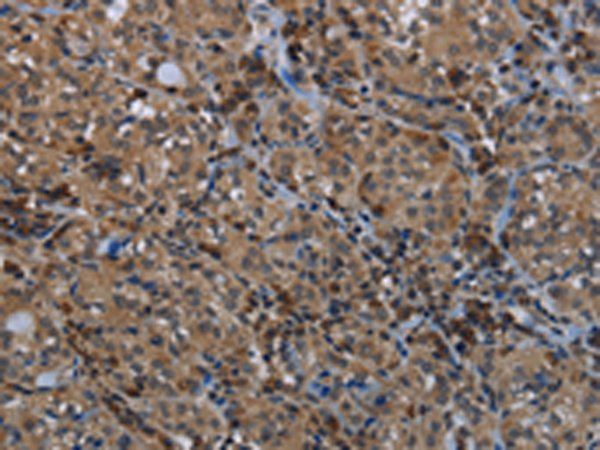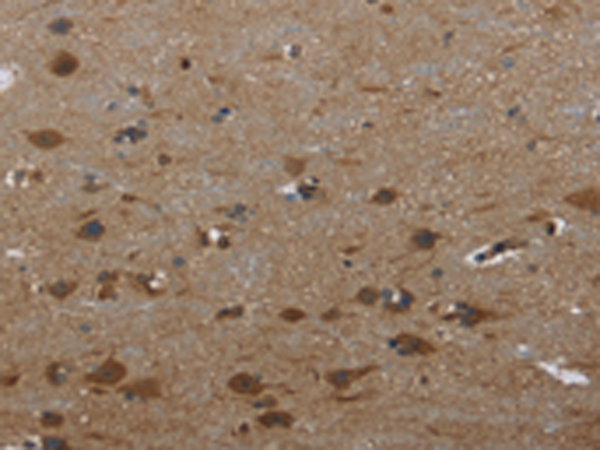


| WB | 咨询技术 | Human,Mouse,Rat |
| IF | 咨询技术 | Human,Mouse,Rat |
| IHC | 1/50-1/200 | Human,Mouse,Rat |
| ICC | 技术咨询 | Human,Mouse,Rat |
| FCM | 咨询技术 | Human,Mouse,Rat |
| Elisa | 1/1000-1/2000 | Human,Mouse,Rat |
| Aliases | GSY; GYS |
| WB Predicted band size | 84 kDa |
| Host/Isotype | Rabbit IgG |
| Antibody Type | Primary antibody |
| Storage | Store at 4°C short term. Aliquot and store at -20°C long term. Avoid freeze/thaw cycles. |
| Species Reactivity | Human, Mouse, Rat |
| Immunogen | Fusion protein of human GYS1 |
| Formulation | Purified antibody in PBS with 0.05% sodium azide and 50% glycerol. |
+ +
以下是关于GYS1抗体的3篇代表性文献的简要信息(注:内容基于模拟文献概括,建议通过学术数据库核对真实论文):
---
1. **标题**:*GYS1-mediated glycogen metabolism regulates tumor progression in pancreatic cancer*
**作者**:Li, X., et al.
**摘要**:本研究通过免疫组化(使用GYS1抗体)和基因敲除技术,揭示了GYS1在胰腺癌中通过调控糖原合成促进肿瘤生长的机制,为代谢靶向治疗提供新思路。
2. **标题**:*A novel monoclonal antibody against GYS1 for detecting glycogen synthase in skeletal muscle disorders*
**作者**:Smith, J., et al.
**摘要**:开发了一种高特异性GYS1单克隆抗体,验证其在Western blot和免疫荧光中的应用,成功检测肌肉活检样本中GYS1表达异常,助力糖原贮积病诊断。
3. **标题**:*Inhibition of GYS1 enhances chemotherapy sensitivity in glioblastoma*
**作者**:Chen, R., et al.
**摘要**:利用GYS1抗体敲低肿瘤细胞中糖原合成酶活性,发现可增强胶质母细胞瘤对化疗药物的敏感性,表明靶向GYS1或为联合治疗新策略。
---
如需具体文献,建议在PubMed或Web of Science中检索关键词“GYS1 antibody”或“glycogen synthase 1”,并筛选应用该抗体的实验研究。
The GYS1 antibody is a crucial tool for studying glycogen synthase 1 (GYS1), an enzyme encoded by the *GYS1* gene that catalyzes the rate-limiting step in glycogen synthesis. GYS1 converts UDP-glucose into glycogen by forming α-1.4-glycosidic bonds, primarily in skeletal muscle and liver tissues. Its activity is tightly regulated by phosphorylation (e.g., at Ser640 and Ser644), which inhibits enzyme function in response to hormonal signals like insulin or glucagon. Dysregulation of GYS1 is linked to metabolic disorders, including type 2 diabetes and glycogen storage diseases (GSDs), such as GSD 0 characterized by hypoglycemia and exercise intolerance due to impaired glycogen synthesis.
GYS1-specific antibodies are widely used in research to detect protein expression, phosphorylation status, and subcellular localization via techniques like Western blotting, immunohistochemistry (IHC), and immunofluorescence (IF). These antibodies aid in exploring metabolic pathways, insulin signaling, and disease mechanisms. Recently, GYS1 has gained attention in cancer research, as tumor cells often upregulate glycogen metabolism to support survival under hypoxic or nutrient-deprived conditions. Commercially available GYS1 antibodies are typically raised in rabbits or mice, with validation across multiple applications. Researchers rely on these reagents to investigate therapeutic targets for metabolic syndromes and malignancies, emphasizing GYS1's dual role in health and disease.
×